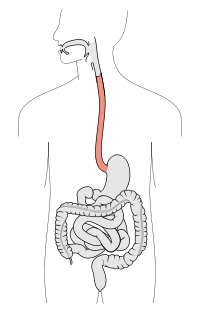
Photo from wikipedia
OBJECTIVES This study aimed to determine the prevalence of reported dysphagia and associated pneumonia risk among patients with stroke in India. METHOD We carried out a systematic review following the… Click to show full abstract
OBJECTIVES This study aimed to determine the prevalence of reported dysphagia and associated pneumonia risk among patients with stroke in India. METHOD We carried out a systematic review following the Preferred Reporting Items for Systematic Reviews and Meta-Analyses guidelines. The primary outcome of interest was dysphagia and pneumonia among patients with stroke in India. Two review authors independently assessed the quality of studies using the Newcastle-Ottawa Scale and extracted related data. Meta-analysis was performed for frequency of dysphagia, associated pneumonia, and its relative risk using a random-effects model. Statistical heterogeneity was computed using the I2 index. RESULTS A total of 3,644 titles were screened, and only eight studies met our inclusion criteria. Based on data from these studies, we calculated the pooled prevalence of dysphagia (47.71%; 95% confidence interval [CI] [20.49%, 70.92%], p < .001) and pneumonia (20.43%; 95% CI [10.73%, 30.14%], p < .001) for patients with stroke in India. We found that the relative risks of pneumonia in patients with stroke and dysphagia versus those patients with stroke and no dysphagia was 9.41 (95% CI [5.60, 15.80], p < .001). Data on length of hospital stay and rates of mortality secondary to pneumonia are also presented. CONCLUSIONS Despite the high incidence of dysphagia and associated pneumonia, the methodological quality of studies is fair and there is little research focused on epidemiological data. We call to arms to those SLPs working with patients with stroke in India to become proactive in both clinical practice and research domains. Supplemental Material https://doi.org/10.23641/asha.17701022.
Journal Title: American journal of speech-language pathology
Year Published: 2022
Link to full text (if available)
Share on Social Media: Sign Up to like & get
recommendations!